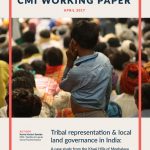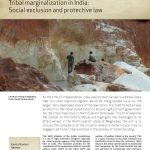Elin Skaar (2024)
Ray Aldred, John Klaasen, and Line M. Skum: Cultivating Transformative Reconciliation (ReconTrans Volume II). PICKWICK Publications
A book chapter by Elin Skaar, a Senior Researcher at the Chr. Michelsen Institute (CMI), where she heads the research cluster on Rights and Legal Institutions and is Coordinator for the Transitional justice Unit. The indigenous Sami and the Kven (a cross-border minority group) in the Nordic countries have long discussed the possibilty, and desirability, […]
Mathilde Thorsen (2018)
Bergens Tidende Debatt 19.07.2018
Mathilde Thorsen has written about water rights and the ongoing water crisis in India in Bergens Tidende. The text ask questions regarding who is in charge of securing people water, and call for global cooperation and respect of the human right to water. You can read the full text in Norwegian below or on Bergens […]
Kavita Navlani Søreide (2018)
Economic & Political Weekly Vol. 53, Issue No. 29, 21 Jul, 2018
Kavita Navlani Søreide has a new publication regarding land rights in Meghalaya in the newest volume of Economic & Political weekly. Mismanagement of Land in Meghalaya The recent clashes in Shillong between the indigenous Khasis and the minority Dalit Sikh community, cannot be dismissed as merely communal identity politics at play. The roots of the […]
Kavita Navlani Søreide (2017)
CMI Working Paper n. 4, 2017
A case study from the Khasi Hills of Meghalaya In India, the Schedule Tribes have remained on the fringes of growth, but less so in the majority tribal areas of the North East. This has increased the interest in the Sixth Schedule, the special constitutional provision relating to these areas, recognising the tribal communities’ rights […]
Kavita Navlani Søreide (2013)
CMI Brief vol. 12 no. 4, 2nd edition
At the time of independence, India used protective law to address fears that its tribal majority regions would be marginalized vis-a-vis the larger, more developed states of the new nation. The ‘Sixth Schedule’ was written into the Indian Constitution to ensure rights of self-government for the tribal majorities in North Eastern Himalayas. This brief explores the context of the Sixth […]
Kavita Navlani (2006)
The Indian Journal of Political Science, vol. 67, no. 1 (Jan. - Mar., 2006), pp. 119-132
There is a broad consensus in social science today, which is indicating a paradigmatic shift in the theorizationof such concepts as ‘nation, nationalism, culture, identity and national integration’. It is unjust and inappropriate to view such concepts as nation, nationalism, culture, identity and national integration etc. without a due consideration to the multiple identity components […]
 The Nordic Truth and Reconciliation Commissions: A new TRC model for resolving historic and ongoing violations of indigenous rights
The Nordic Truth and Reconciliation Commissions: A new TRC model for resolving historic and ongoing violations of indigenous rights




